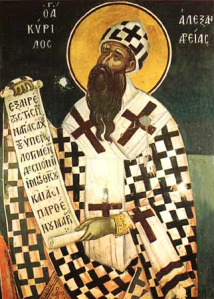From Christ we have received the knowledge of things about to happen.
For it is even He Who “reveals the deep things out of darkness,” and knows those that are hidden.
And “in Him are all the treasures of wisdom, and the hidden things of knowledge.”
He changes times and seasons: and refashions the creation to that which it was at the beginning.
For it was by His means that, when it existed not, it was brought into existence according to the will of God the Father. For He is His living and personal power and wisdom.
And again by His means it will easily be changed into that which is better. For as His disciple says, “We expect new heavens, and a new earth, and His promises.”
[…] Before the advent of Christ the Saviour of us all from heaven, various false christs and false prophets will appear preceding Him, falsely assuming to themselves His person, and coming into the world like eddies of smoke springing up from a fire about to break forth.
“But follow them not,” He says. For the Only-begotten Word of God consented to take upon Him our likeness, and to endure the birth in the flesh of a woman, in order that He might save all under heaven.
And this to Him was an emptying of Himself, and a humiliation. For what is the measure of humanity compared with the divine and supreme majesty and glory?
As one therefore Who had humbled Himself to emptiness, He deigned to remain unknown, even charging the holy apostles before His precious Cross that they should not reveal Him.
For it was necessary that the manner of His dispensation in the flesh should remain hid, that by enduring as a man for our sakes even the precious Cross, He might abolish death, and drive away Satan from his tyranny over us all.
For, as Paul says; “The wisdom that was in Christ, by which is meant that which is by Christ, none of the rulers of this world knew: for if they had known it, they would not have crucified the Lord of glory.”
It was necessary therefore that He should remain unknown during the time that preceded His passion. But His second advent from heaven will not happen secretly as did His coming at first, but will be illustrious and terrible.
For He shall descend with the holy angels guarding Him, and in the glory of God the Father, to judge the world in righteousness. And therefore He says, “when there arise false christs and false prophets, go you not after them.”
Cyril of Alexandria (c. 376-444): Commentary on Luke, Sermon 139 (on Luke 21:5-13).









